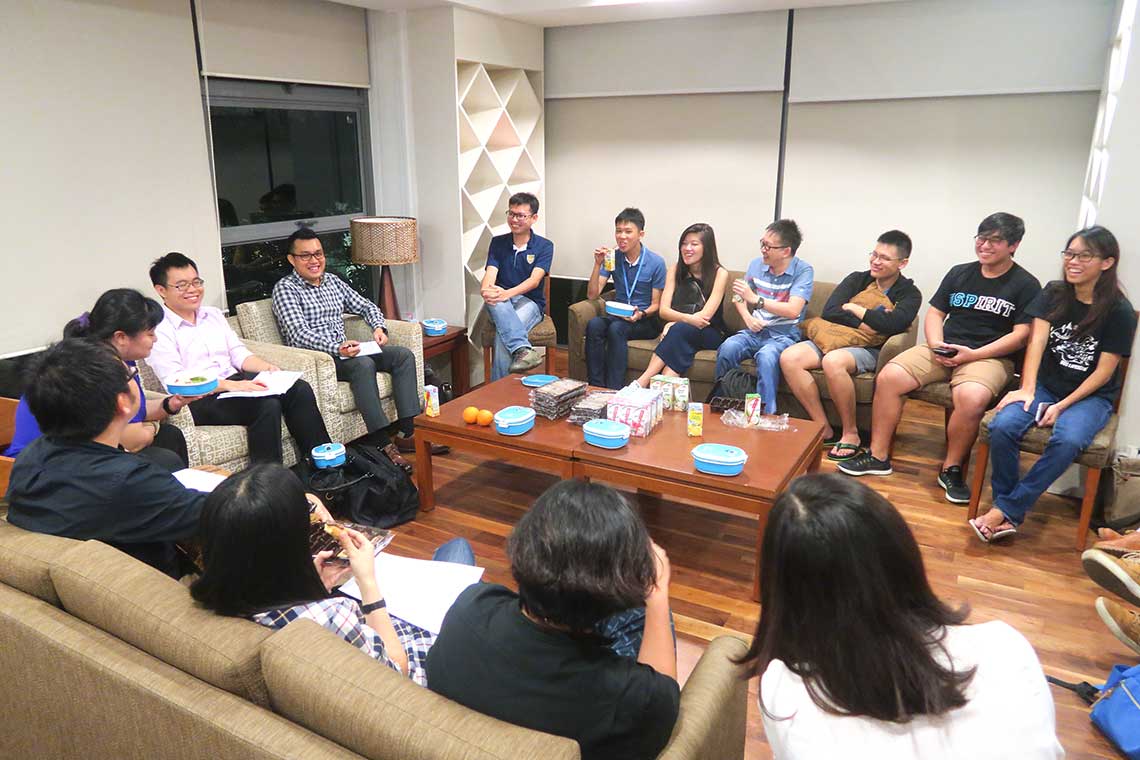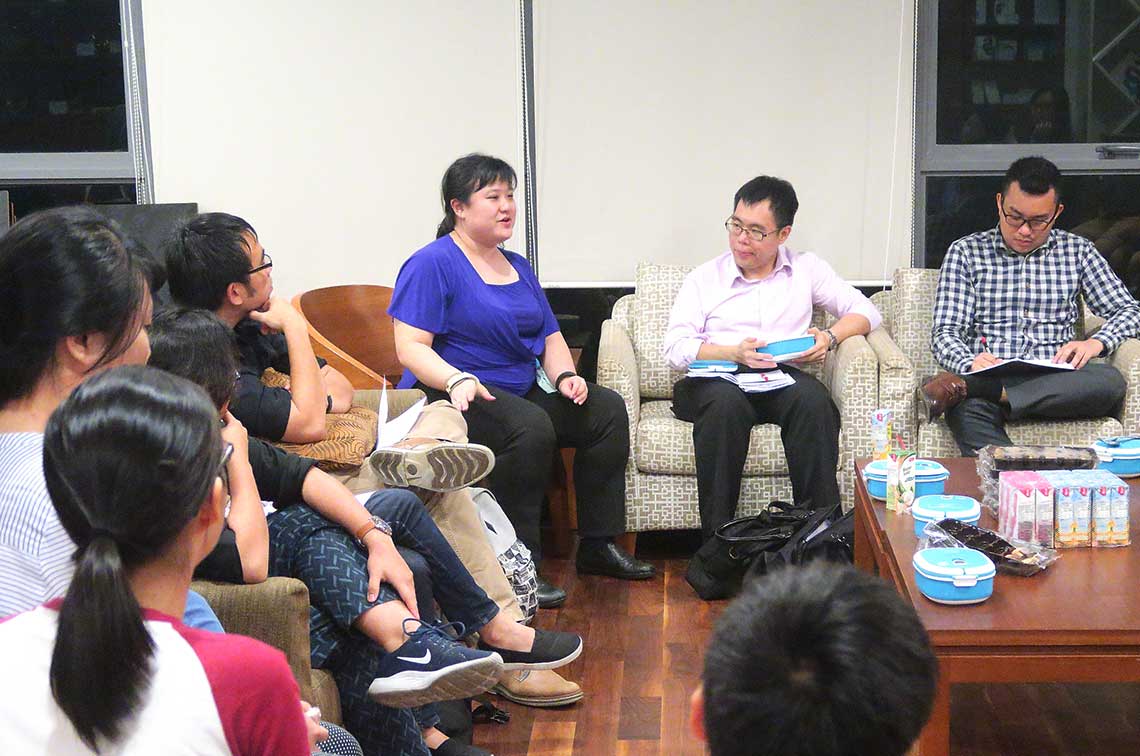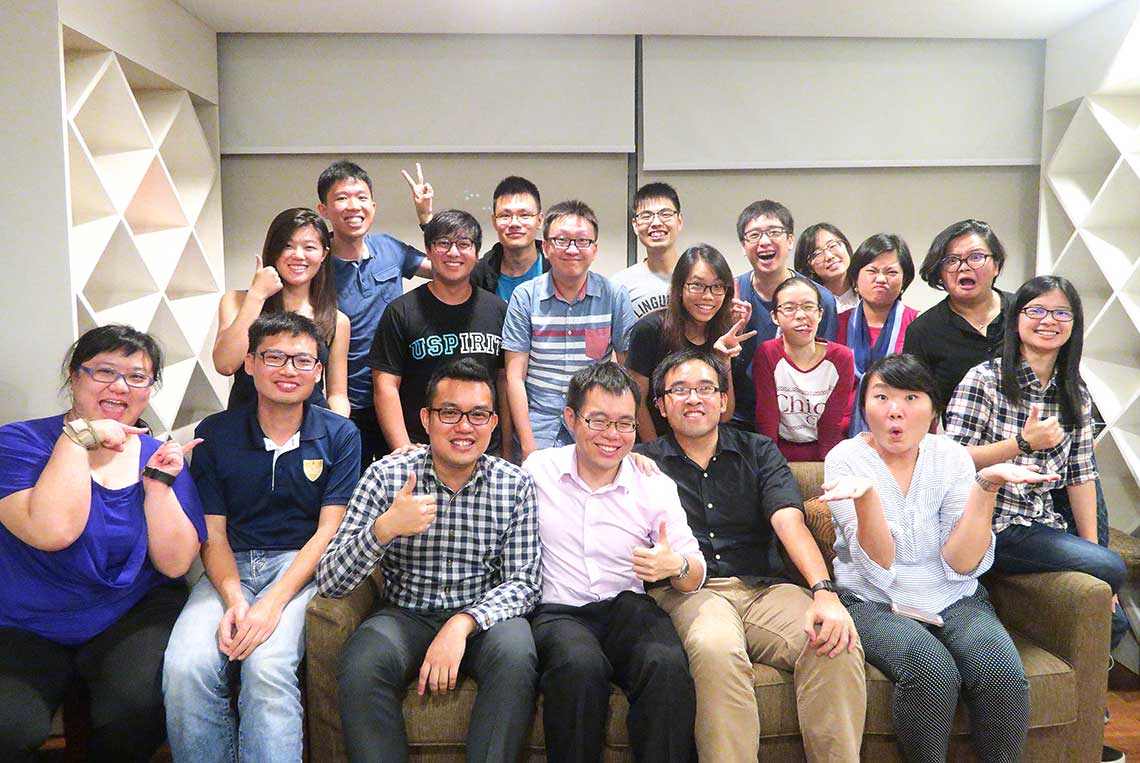USP Alumni Teachers Share Experiences
Contributed by Annabel Tan (English Literature + USP, Class of 2018) and Ow Yeong Wai Kit (English Literature + USP, Class of 2013)
Published: 09 June 2017
Who says teachers are doomed never to enjoy any weekday night dates? Debunking this myth – and more – was a lively sharing session between USP alumni in the teaching profession and USP students on a Wednesday night in May 2017. It was a relaxed and occasionally hilarious exposé of all the pressures and pleasures of teaching in Singapore, providing a clearer picture to prospective teachers about what joining the education service truly entails.

Eight USP alums—who are currently teachers—shared their experiences as educators at this get-together session with current USP students
who may be considering teaching as a career and also, those who are on Ministry of Education (MOE) Teaching Scholarship/Awards.
Conscious of the divide between perceived and actual conditions of teaching life, the organisers – led by Christopher Chok (History + USP, Class of 2014), and comprising Esti Asmira (History + USP, Class of 2014), Ow Yeong Wai Kit (English Literature + USP, Class of 2013) and Tay Su Yin (Political Science + USP, Class of 2013) – felt the need for a down-to-earth dialogue about the realities of being a classroom teacher. They brought together a group of fellow USP alumni teachers to address questions from their juniors, while sharing their experiences including both inspiring tales of success and a few chilling horror stories!
Christopher, the moderator for the session, steered the conversation to discuss matters ranging from career opportunities, having work-life harmony and remaining true to one’s ideals. Different stages of a teacher’s life were addressed. The teachers recounted a wide variety of poignant moments, from their initial years as contract teachers or untrained teachers attached to various schools, to enrolling as students at the National Institute of Education (NIE), before becoming Beginning Teachers and fully-fledged educators. A combination of humour and seriousness pervaded each story, highlighting the complex roles that teachers are expected to play.
“The session was an invaluable opportunity for the USP Alumni to give back to the USP community. It was an evening of intense, candid and heartfelt discussions. I believe that the session helped to clarify misconceptions and painted a clearer picture of the Education Service [in Singapore] to prospective teachers.”
— USP alum Christopher Chok (History + USP, Class of 2014)
Reminiscing his days in NIE and completing a Post-Graduate Diploma in Education (PGDE), Zachary Kok (Physics + USP, Class of 2012) described the pleasure of being in a classroom system after years of fleeing module groups in NUS. Fellow physics teachers could “geek out” with him, and there was a shared curriculum that allowed them to bond over the course of their graduate studies. Beyond their teaching subjects, modules taken at NIE ranged from pedagogy and assessment to public speaking as well as Character and Citizenship Education.
One of the recurring ideas in this sharing session was the need to differentiate between intrinsic and extrinsic reasons for remaining in the teaching profession. Gregory Loh (English Literature + USP, Class of 2014) described how some teachers experienced the “death of a thousand cuts”. Unlike other professions in which projects can serve as landmark achievements, teaching requires attention to a wide array of administrative and teaching tasks that can become potentially draining. Creating lesson plans – a skill learnt at NIE – constitutes but a tiny fraction of each work-day, which requires handling everything from Co-curricular activities (CCAs) and committee work to counselling students and managing events (not to mention the difficult task of navigating staff-room politics!).
Given how extrinsic motivation, stemming from approval from colleagues or popularity with students, is insufficient to face the demands of teaching, our teacher-alumni also admitted that these measures of success are sometimes impossible to achieve consistently every day. Although students may prefer a popular teacher, discipline and rigour are nevertheless needed in order for students to develop holistically. Intrinsic motivation is needed so that teachers are endowed with a deep sense of purpose and integrity in withstanding the onslaught of daily challenges. Describing the allure of more lucrative options such as those in the tuition industry, Su Yin talked about her conviction to stay in the profession for the long term, arguing that change only happens when good teachers remain in service.

USP alum Julienne (in purple) sharing her experience about the challenges of being a primary school teacher.
Julienne Tan (Chemistry + USP, Class of 2012) further discussed the difficulties of primary school teachers, countering the perception that there was a lack of critical thinking required to deal with younger students. On-the-job problem-solving involved such varied tasks as defining apparently simple words like “entertain” to mustering the energy required for classroom management. Students may be unable to engage in simple addition, asserting that “6 + 6 = 4”. A teacher’s role is to develop instincts for finding out where the misconceptions start, though a hundred of such problems could exist at any one time for a classroom full of students. Indeed, despite not fully utilising her expertise in Chemistry, Julienne emphasised how the thinking skills required in primary school are no less rigorous and sometimes supersede those required in other professions. The imperative for teachers then, to paraphrase a renowned quotation of Einstein’s, is to “simplify without being simplistic”.
Teaching in secondary schools presented another set of challenges. Discussing the socio-economic conditions faced by students, Esti discussed how teachers often had to deal with students’ apathy to studying and how such problems related to deeper issues confronting students at home. Teachers are at the frontline – identifying and reporting cases of child abuse, or helping students cope with tensions in their family. What happens outside the school compound cannot be controlled, but it affects students emotionally and physically. Hand-holding is no mere metaphor: a teacher might even need to place pens physically in students’ hands and keep them awake in tests which they would have otherwise slept through.
Our teacher-alumni also shared personal experiences about the spectrum of cases involving behavioural problems that exist in schools. Each teacher needs the support system of social services, upper management and other colleagues to help students. What occurs in primary school often continues in secondary school, and teachers often have to wait quite a while to see changes in students’ behaviour. It might take weeks, months, or entire school years to pass by, but it starts with teachers noticing minute, incremental changes, and affirming students when small improvements are made.
One of the most important takeaways for USP students concerned the tensions between institutional policies and personal attitudes about what education should be. Learning the language of the institution one works in is necessary to communicate new ideas that enhance or adapt existing frameworks. Clara Ang (Geography + USP, Class of 2013) delineated the challenges one might experience after leaving USP. She pointed out that critical inquiry and active engagement with societal issues may not always be the top priority in the education sector, making it difficult to have conversations (like those that take place in USP) with other educators and colleagues who influence educational policies. Finding comrades with similar philosophy to learning, however, could help to mitigate this and hopefully, in the long term, be able to collectively influence policy makers in a positive way.
"I sometimes forget that teachers were and still are students – the candid thoughts of the teaching alumni were a wonderful reminder that the workforce allows people to keep trying, fail sometimes, and always try better again."
— USP student Annabel Tan (English Literature + USP, Class of 2018)
A great measure of hope and optimism pervaded each teacher’s stories. Christopher ended the session with the reminder that “with great power, comes great responsibility”. Professionalism in teaching is not about conflating private identities and teaching personas. Rather, it is being aware about how much a teacher can influence a class or a single student, even in the slightest of ways. To teach is indeed to stand on hallowed ground (a phrase that Christopher learnt from his JC English Literature teacher) and yet, as our USP teacher-alumni would remind us, it doesn’t have to mean missing out on weekday night dates.

USP teacher-alumni and USP students posed for a group photo after an insightful and meaningful sharing session.

